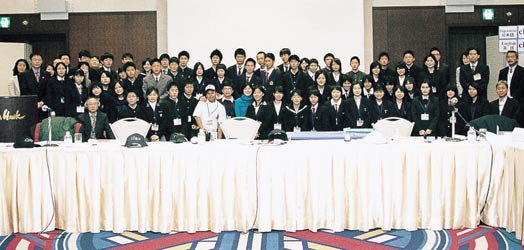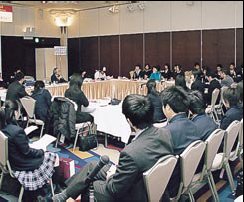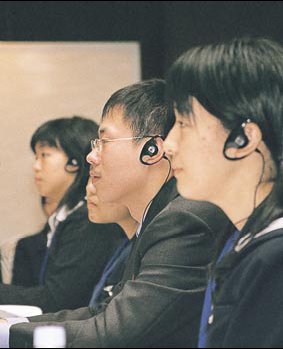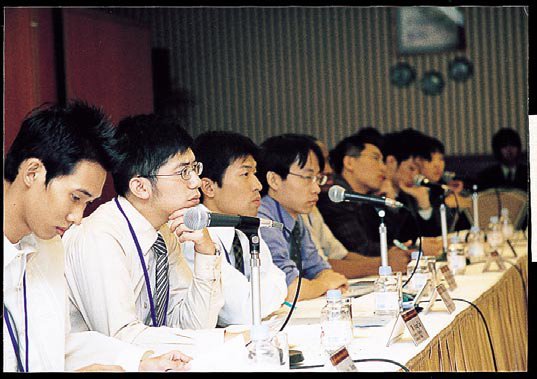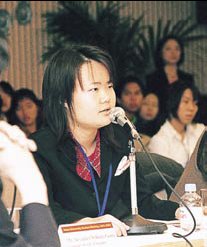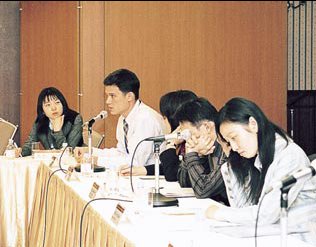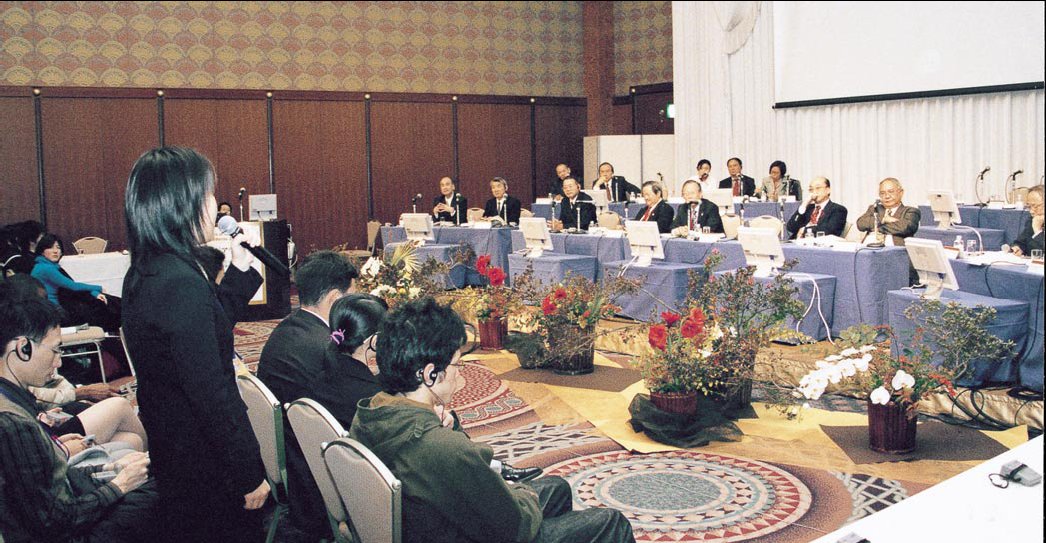
Report on the Dialog between Asian University Presidents and University / High School Students
Tsuneyuki YAMAMOTO
Faculty of Pharmaceutical Sciences
As a pre-session for the 5th Conference of Asian University Presidents, the Dialog between Asian University Presidents and Asian Students (organized by Professor Tsuneyuki Yamamoto of the Faculty of Pharmaceutical Sciences and Associate Professor Mark Fenwick of the Faculty of Law) was held on Saturday, November 27, 2004. Participants from Japan included Kyushu University President Tisato Kajiyama, and Vice Presidents Yosaburo Shibata and Masaharu Yanagihara, and Ritsumeikan University Chancellor Toyo Omi Nagata. In addition, there were 19 presidents and vice presidents of universities in nine Asian countries other than Japan. Student participants numbered approximately 200 and included students who had participated in the Asian High School Student Meeting and the Asian University StudentMeeting, both held on the same day.
|
|
Asian High School Students Meeting
Tsuneyuki YAMAMOTO
Faculty of Pharmaceutical Science
1. "Environmental Problems ? What should we do as a high school student?" @@Person submitting: Misaki Matsumura (Chikushigaoka High School, Japan) 2. "Cyberspace in Classroom!" @@Person submitting: Ahmad Fansuri (Al Izhar High School, Indonesia) The discussion enjoyed active rounds of questions and answers right from the beginning and hands were constantly in the air right through to the end. Though questions and answers were presented with the aid of simultaneous interpreters, Japanese high school students were among those trying their best to speak in English. During the 5-minute break, Mr.Thai Trung Dang, a Vietnamese student performed a song, and it was clear that even within the stressful atmosphere of the meeting, the students were able to relax. Due to time constraints, a full exchange of views was not possible in some cases, and in the end two sides developed in the discussions of each theme. Students from Kyushu University were also present as volunteers and, with their assistance, the conference was able to develop summary conclusions. Fong Clarisse (Hwa Chong Junior College, Singapore) and Daisuke Shigetomi (Nagoya High School, Japan) presented these conclusions in thegDialog between Asian University Presidents and Asian Students.hThrough this meeting, both students participating as speakers and members of the audience were able to renew their appreciation of the importance of clearly identifying social problems and transforming thoughts into concrete forms and actions.
ASIAN UNIVERSITY STUDENTS MEETING
Mark FENWICK
Faculty of Law
As for the substance of the presentations and discussion a number of themes emerged. Firstly, although emphasis was placed on the importance of enhancing regional integration (within the framework of ASEAN + 3) it was agreed that such regional integration should not simply copy models of regional integration occurring elsewhere in the world. Instead a distinctly gEast Asian wayh should be found that respects the shared traditions of the countries of this region. Secondly, students were keen to focus on the security challenges that currently exist in Asia, particularly the threat posed by international terrorism. Participants discussed the importance of eradicating the underlying causes of terrorism, notably poverty and lack of education, as well as on promoting regional cooperation in security policy. With regard to the second topic of environmental protection, the presentations and discussion focused on whether economic development can ever be reconciled with the preservation of the natural environment. In general, the students were cautiously optimistic believing that sustainable development is possible. However, for this goal to be achieved consumption habits need to be moderated and foreign companies investing in the developing world need to adopt more responsible, environmentally sensitive practices. The presentations were all of an extremely high standard and stand testimony to the quality of the universities represented at this yearfs Conference. The discussion that followed the presentation was equally impressive. Although there was some disagreement amongst participants on various points, there was a mutual respect for those holding differing opinions, and the atmosphere of the discussion was very cordial. Although this sort of meeting may not necessarily result in tangible action or programs, the investment in facilitating dialogue amongst younger people from a diverse range of national backgrounds is of great value.
| |||||||||
Asian High School Student Meeting@evaluation
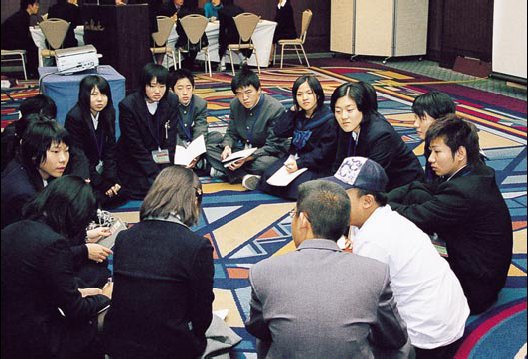
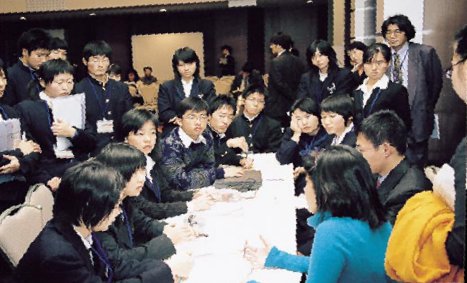
|
My honest opinion is that there was not enough time. The beginning of the high school student meeting, which I also attended, was more an exchange of views rather than a discussion, perhaps because everyone had considered many things before coming to the meeting. However, the purpose of the meeting was to develop an understanding of conditions in other countries and what people there are thinking. Gaining this information through peoplefs voices rather than through books gave me a greater sense, in particular, for environmental problems. Even before the meeting, I had learned quite a bit about Asia through my own efforts, but at the meeting, I was able to develop an understanding of differences in thinking that exist between countries, and I am now more aware of overseas issues and can now see environmental problems at a more global scale. An important result of this meeting was that I got a very real sense that I was able to learn various things on my own. I was also able to make many friends, and I am grateful to all of the people involved in the meeting. Thank you very much. (Tatsuya Fujinaka, Chikushigaoka High School)
|
|
Comment on the Meeting and Dialog This meeting provided an excellent opportunity to turn the eyes of students, who tend to focus on English-speaking countries, toward Asia. I, therefore, made them do presentations on Asia in their English classes and took other steps to boost their sense of participation ahead of time. At the high school student meeting, I was appalled to see in discussions that the conversation skills and English abilities of students from other parts of Asia are much better than those of Japanese students. I teach English, and the great difference among high school students, regarding their English abilities, was a shock to me, as well. In the dialog with university presidents, questions such as gWhat are the advantages of becoming a foreign student at an Asian university?h asked by university students, appear to have been very interesting for high school students. The university presidents, too, displayed great individuality and did not fit the image of givory towerh scholars. In the final reception, discussions of dreams for the future with not only high school students from other parts of Asia but also Kyushu University students and students from other high schools were the best result for our students, and it appears that they are continuing their conversations by email. For high school students, experiences can lead to great developments. Our students experienced significant personal growth through this Conference of Asian University Presidents, which widened their perspective to include all of Asia and allowed them to discuss various problems from a global perspective. I would like for more events like these to be held in the future. (Noriko Nagashima, Teacher, Kasumigaoka Senior High School)
|
|
When the meeting ended, I was left with an unspeakable sense of loneliness and fulfillment. That is an indication of how much I gained. Before the meeting began, I had conversations with high school students from other countries, became friends with them, and when the meeting started, saw them exchange opinions like arrows. I, too, worked desperately to organize my thoughts and raised my hand to speak, but was able to do so only once. No matter how much time there was, it would have been too little. I wanted to talk about as many things as possible with many people, but, unable to speak English, I was frustrated. Even so, however, I was extremely happy that my feelings were understood, and it is my ardent desire to exchange mail with the friends I made. The feelings I experienced cannot be expressed in words. I feel that if most people could have an opportunity as wonderful as this, the world would change. I would like to spread to as many people as possible the feeling that we can take action. (Chihiro Yahara, Jonan High School) (Chihiro Yahara, Jonan High School)
|
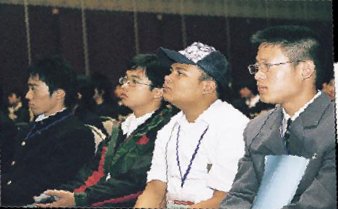
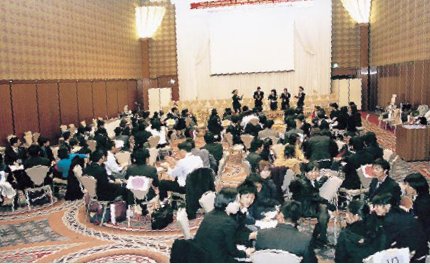
Asian University Student Meeting@evaluation
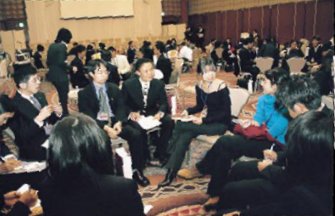
|
I was really honored to be a part of the meeting. I made a lot of new friends in the beautiful city of Fukuoka, and discussions about Asian regional issues were a great experience. I believe that the meeting opened my mind and will motivate me to do my best for my country, Asia, and the world. I will bring what Ifve learned from the meeting to share with my colleagues at the Institute of Technology Bandung, Indonesia. I really hope that ITB can follow the ideas of this meeting and become the host for the next one. Itfs a good meeting, Ifm really thankful for having had the opportunity to come, and I look forward to a chance to cooperate with Kyushu University in the future. Thank you very much. (Elin Haryanto, Institut Teknologi Bandung)
|
|
I think of the meeting as a day during which I was able to develop an understanding of how students from other Asian countries think and act. From the perspective of connections with other parts of Asia, I think Kyushu was the best place to hold this meeting. I think the participants, not just myself, were able to reconfirm their understanding of Asian values and develop a personal feel for them by discussing them. Discussions with high school students were also very interesting for me. Comparing what high school students from Singapore, Hong Kong, and Indonesia are thinking and their reasons for wanting to go to college with my own thoughts and feelings when I was a high school student, took me back to that time in my own life. The university presidents fervently promoted their universities and piqued my interest in studying in another part of Asia. I developed a sense of the need for Asian universities, one based on strengths different from those of European and American universities. Nevertheless, the universities appear to feel threatened by the outflow of students to Europe and America, so I think action going beyond promotion is necessary for these universities. (Hidetaka Yamamura, Ritsumeikan University)
|
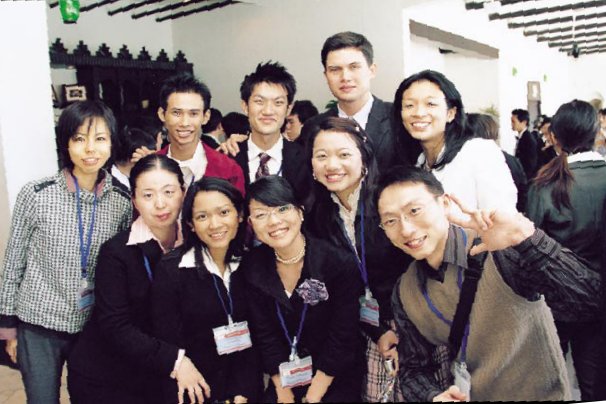
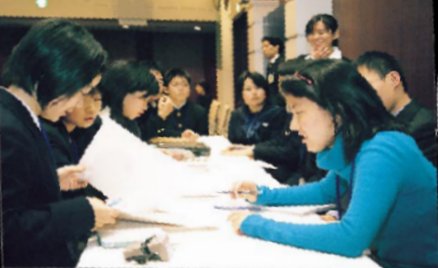
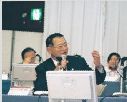 The second part of the meeting was titled, "Future Challenges -A Cross-Generational Dialogue" and featured an exchange of questions and answers between the university presidents, on one side and the university and high school students, on the other. Straightforward questions were asked on topics such as acceptance of foreign students by individual universities, the significance of attending an Asian university as a foreign student, the position of Asian universities on a global scale, and the pluses and minuses of establishing an Asian consortium. And the university presidents, though at times finding it quite challenging, responded with grace and enthusiasm to every question. In response to a question on the role of universities in Asia, Pornchai Matangkasombut, President of Mahidol University passionately discussed the importance of sharing knowledge based on respect for differences in national conditions and characters. Additionally, Rector Usman Chatib Warsa of the University of Indonesia let everyone stand up and explained the importance of understanding and loving your neighbor.
The second part of the meeting was titled, "Future Challenges -A Cross-Generational Dialogue" and featured an exchange of questions and answers between the university presidents, on one side and the university and high school students, on the other. Straightforward questions were asked on topics such as acceptance of foreign students by individual universities, the significance of attending an Asian university as a foreign student, the position of Asian universities on a global scale, and the pluses and minuses of establishing an Asian consortium. And the university presidents, though at times finding it quite challenging, responded with grace and enthusiasm to every question. In response to a question on the role of universities in Asia, Pornchai Matangkasombut, President of Mahidol University passionately discussed the importance of sharing knowledge based on respect for differences in national conditions and characters. Additionally, Rector Usman Chatib Warsa of the University of Indonesia let everyone stand up and explained the importance of understanding and loving your neighbor.